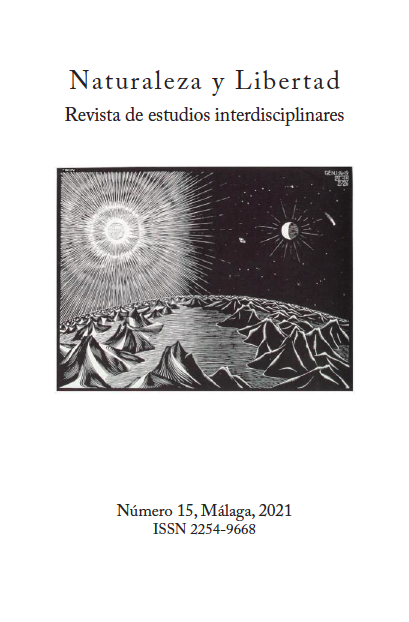Transhumanism, Morality and Determinism
Science and Philosophy in Alex Garland’s Films
Keywords:
Philosophy, Science, Posthumanism, Transhumanism, DeterminismAbstract
Following the idea that films are excellent cultural items that help to transmit philosophical knowledge and skills to students, in this paper we propose the use of Alex Garland’s films, exemplified in his works Ex Machina (2015), Annihilation (2018) and Devs (2020) for students to acquire knowledge and philosophical skills. These films deal with philosophical issues such as the mind-body duality, the possibility of a robot being understood as a human being, morality or lack thereof in the laws of nature, or strong determinism, among others. They are, therefore, a magnificent source of philosophical knowledge that can be used in both secondary and university education.
Downloads
Metrics
References
Bruhn, J., y Hart, H. (2020): «Melting, Blurring, Moaning. Annihilation as Narrative Adaptation to Planetary Crisis?», Diegesis, 9(2).
Ersoy, G. (2019): «Crossing the boundaries of the unknown with Jeff VanderMeer: The monstrous fantastic and “abcanny” in Annihilation», Orbis Litterarum, 74(4), 251-263.
García Manrique, R. (2016): «Ex machina, o sobre la dimensión corporal de lo humano», Revista de Bioética y Derecho, (37), 171-176.
Gardner, K. (2020): Cracking the quantum code. Physics World, 33(7), 46.
Garland, A. (2015): Ex Machina. Sanata Monica, CA: Lionsgate, A24.
Garland, A. (2018): Annihilation. Hollywood, CA: Paramount.
Garland, A. (2020): Devs. Los Angeles, CA: Hulu.
Black, Jack (2020): «Devs and the Parallax Ending. Critical Studies in Television Online», CST Online. Recuperado de: https://cstonline.net/devs-and-the-parallax-ending-by-jack-black/ [Consultado: 27/06/2021]
Hadj, E. B. (2021): «The (Im) Possibility of Adaptation in Alex Garland's Annihilation», The Neutral: Graduate Journal of Cinema and Media Studies, (2).
Kjærulff, C. (2021): «The Ambiguous Portrayal of Nature in Annihilation», Leviathan: Interdisciplinary Journal in English, (7), 127–138.
Rodríguez Valls, F. (2001): La mirada en el espejo: ensayo antropológico sobre ‘Frankenstein’ de Mary Shelley. Oviedo: Septem.
Downloads
Published
How to Cite
Issue
Section
License
Those authors who have publications with this journal, accept the following terms:
1. Copyright and licensing information are clearly described on the journal’s web site: all content published in Naturaleza y Libertad is open acces without limit, and are subject to the Attribution-NonCommercial-ShareAlike 4.0 International (CC BY-NC-SA 4.0) license. The full text of which can be consulted at https://creativecommons.org/licenses/by-nc-sa/4.0/
2. It is the responsibility of the authors to obtain the necessary permissions for the images that are subject to copyright. The authors whose contributions are accepted for publication in this journal will retain the non-exclusive right to use their contributions for academic, research and educational purposes, including self-archiving or deposit in open access repositories of any kind. The electronic edition of this magazine is edited by the Editorial de la University of Malaga (UmaEditorial), being necessary to cite the origin in any partial or total reproduction.
3. This journal allows and encourages authors to publish papers on their personal websites or in institutional repositories, both before and after their publication in this journal, as long as they provide bibliographic information that accredits, if applicable, your posting on it.
4. In no case will anonymous papers be published.

18.png)













